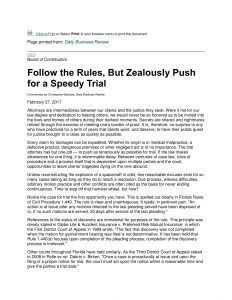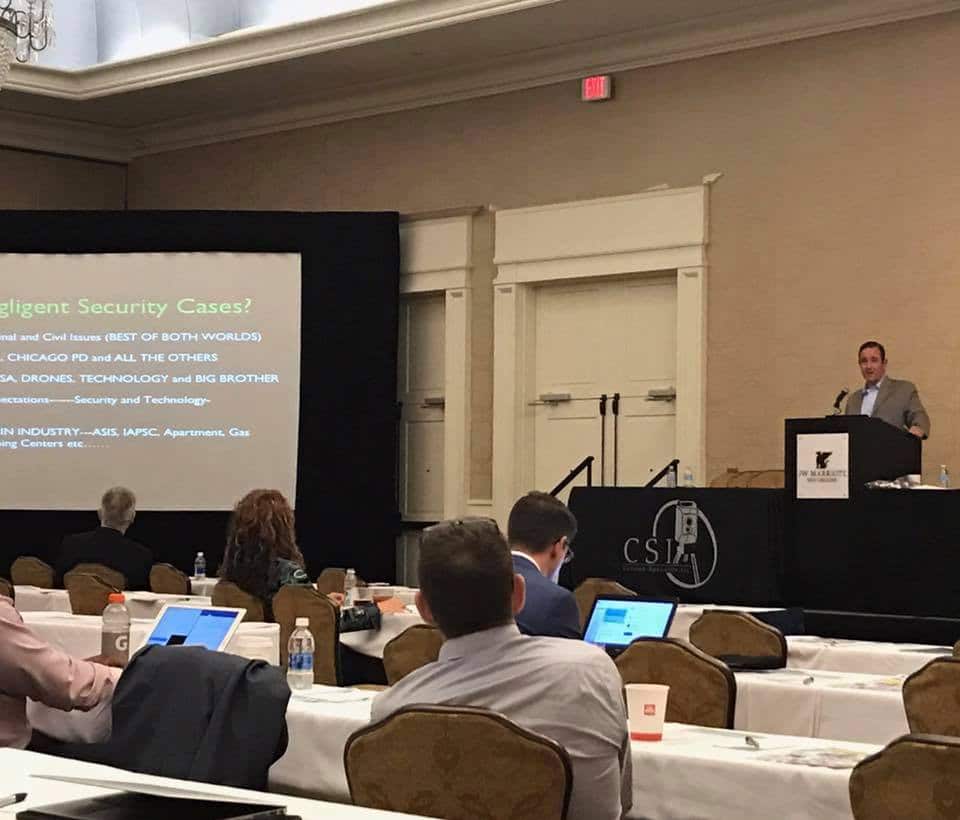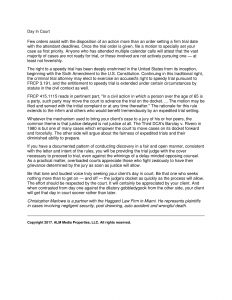The Haggard Law Firm’s Todd Michaels will be the featured Guest Speaker for the upcoming Broward County Trial Lawyers Association scheduled for Tuesday, April 4th. Michaels’ topic of discussion “Trying Negligent Security Cases in Florida”.
Tag: premises liability South Florida
VIDEO: Negligent Security & Mass Shootings
Has the increased number of mass shootings and victims of these tragedies changed what should be considered adequate security for businesses and properties where large groups of people commonly gather?
Our Michael Haggard discusses the topic in our latest HLF TV installment.
Haggard Law STLA Presentation
The Haggard Law Firm’s involvement with the Southern Trial Lawyers Association was on full display this past week and over the weekend during the STLA Conference in New Orleans.
Managing Partner, Michael Haggard was a featured presenter at the conference delivering a speech on Security. Our own Christopher Marlowe, a current STLA Board Member attended board meetings and former STLA Warhorse recipient, Andy Haggard was also in attendance at this weekend’s conference.
We are looking forward to next year’s conference!


Haggard Law Article on Speedy Trials Published in DBR
Today, Daily Business Review published the Haggard Law Firm attorney Christopher Marlowe‘s article highlighting the importance of pushing for a speedy trial.

Here is the body of the article by Marlowe:
Continue reading “Haggard Law Article on Speedy Trials Published in DBR”
VIDEO: The Role of Foreseeability in Negligent Security
The cornerstone of solidifying a negligent security case for a personal injury attorney is proving foreseeability of crime. Michael Haggard of the Haggard Law Firm discusses in this video.
Haggard Attorneys to Present During 2017 Workhourse Seminar
The Haggard Law Firm’s Managing Partner Michael Haggard and Partner Todd Michaels will be among the presenters at this year’s Workhorse CLE Seminar presented by the Florida Justice Association. The event will be held in Orlando between February 28th and March 3rd.
Haggard’s will deliver his presentation, Proof and Argument of Liability in “Negligent Security” Cases, during the premises liability portion of the event on March 1st.
Michaels’ presentation, Daubert and the Non-Scientific Witness, will be given during the evening session on Tuesday, February 28th.
Continue reading “Haggard Attorneys to Present During 2017 Workhourse Seminar”
Background Checks: Everywhere and Nowhere
By: Christopher Marlowe, The Haggard Law Firm
The background check. Examinations of our past seem so common in every corner of our lives, that on that rare occasion where we are not asked to verify our personal information or consent to an examination of it, the transaction seems either charmingly quaint or mildly suspicious. Our criminal history, finances, family relations, utilities, medical history, schooling or employment, to name a few, are routinely brought forth and scrutinized (or verified) as a necessary part of routine personal and business operations.
The ubiquity of the background check has fomented a public expectation that virtually every person we encounter has been screened for one thing or another. Certainly, the priest or teacher is screened for child or sexual related offenses. The Uber driver has been thoroughly vetted for traffic offenses. The apartment manager’s personal finances are in order, such that the proper handling of rents is not in jeopardy.
These expectations, however reasonable, are not subject to uniform regulation and even more rarely are they mandated by law. The inconsistent handling of sex offender regulations helps highlight our misperception of the efficacy and regularity of background checks. Society considers itself tough on sex offenders, and lawmakers fashion themselves as protectors of the children and those most vulnerable. Florida Statute 948.30 is a good example. If a sex crime victim was under the age of 18, the offender cannot work for pay “or as a volunteer at any place where children regularly congregate, including, but not limited to, schools, child care facilities, parks, playgrounds, pet stores, libraries, zoos, theme parks, and malls.”
Continue reading “Background Checks: Everywhere and Nowhere”
Evidence Preservation in Fire Cases
Article By Pedro Echarte, The Haggard Law Firm
When handling personal injury/wrongful death cases resulting from fires, the importance of quickly notifying the property owner of the potential claim and gaining immediate access to the property to the perform a site inspection is imperative. While in other types of cases (e.g., drowning, automobile, aviation, medical malpractice, negligent security) the evidence required to prove your case is generally preserved, that is generally not the case when it comes to litigation stemming from fires because landowners (whether residential or commercial) generally want to promptly repair their premises after a fire in order to avoid a significant loss of income. Once the property is altered or repaired, it will be difficult to determine not only the cause of fire, but also what fire safety measures that property had at the time of the fire and whether they operated as intended.
In fire cases that we have handled, we have accomplished early notification to the potential defendant and coordination of a site inspection in one of two ways. Generally, we first attempt to reach the property owner directly, informing them of the potential claim and requesting access to the property. If we are unable to contact the property owner or if the property owner refuses to give us access to the property, we file the lawsuit along with an emergency motion seeking to enjoin the property owner from repairing the property and requesting access to the property for a site inspection.
String of Gas Station, Retailer Parking Lot Robberies
In the last week, there have been a string of robberies at gas stations and parking lots of popular retailers in South Florida. A large percentage of the negligent security cases The Haggard Law Firm has litigated in the last decade have included violent incidents involving these types of businesses. Cases like Snell VS Family Food Saver II, CORP which occurred on the property of a gas station and Pilotos v. Ryta Food Corp which was a deadly shooting in the parking lot of a grocery store.
Following the most recent news, Haggard Law Attorney Todd Michaels said:
“Every business owner who holds themselves open to the public has a duty to assess the risk of crime occurring on their property, and to implement adequate security based on that risk. All too often, we have seen business owners fail to do so, and the result is both tragic and predictable. Unless business owners are doing their part, there is little that the police or individuals themselves can do to remain safe.”
FULL ARTICLE ABOUT Palm Beach County crime spree:
Continue reading “String of Gas Station, Retailer Parking Lot Robberies”
Sun Sentinel: Haggard to Lead NCVBA
The South Florida Sun Sentinel has listed Michael Haggard’s election as the President- Elect of the National Crime Victim’s Bar Association.

















